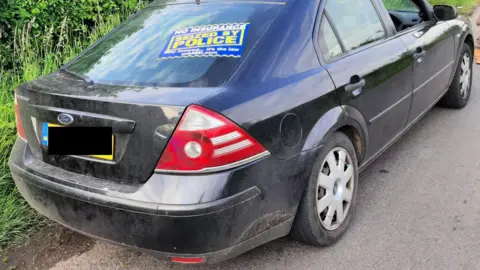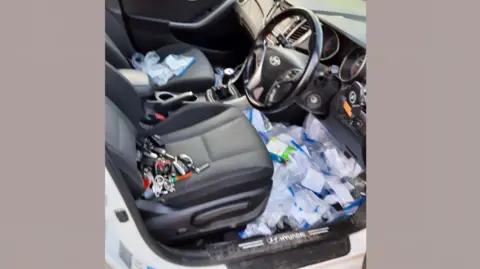'Rogue' airport parking firms targeted by police
 Avon and Somerset Police
Avon and Somerset PoliceHolidaymakers have been warned by police to only use official airport parking companies after vehicles suffered suspected criminal damage and were left with "unexplained additional mileage".
Avon and Somerset Police (ASP) said it held a day of action targeting unofficial parking firms operating near Bristol Airport.
Some customers' cars were involved in parking and driving offences while they were on holiday or were driven by people suspected of being uninsured, police said.
Others were also given back to their owners in an "undriveable or unroadworthy" condition, police added.
The operation was held on 3 June and involved North Somerset Council, the Immigration Enforcement Team and the Motor Insurance Bureau.
ASP said officers involved found and returned 20 vehicles to their owners after unofficial meet-and-greet companies did not give them back straight away, leaving the families waiting "for hours" after landing.
"Not only were holidaymakers left abandoned, but one of the images from the operation shows a customer's vehicle was being used to drive around the area returning keys which were piled up on the front seat and in the footwell, which were effectively insecure and at risk of being stolen," a police statement said.
 Avon and Somerset Police
Avon and Somerset PoliceSgt Danielle Hardaway, one of the senior officers involved in the day of action, said: "We have had reports of cars being returned damaged or with excess mileage and, in some cases, have been driven by people who are uninsured as well as being involved in driving offences.
"In some cases, vehicles left in dangerous or obstructive positions in local villages had to be towed away.
"We ask people to always choose reputable parking operators, and to choose them carefully, and if the price seems too good to be true, then it often is."
The force added people should look for approved businesses when choosing where to leave their cars.
Bristol Airport chief executive David Lees said he welcomed the operation targeting what he called "rogue operators".
"They are a nuisance to local communities and cause distress to customers who use them – with many completely unaware of where their cars end up," he added.
